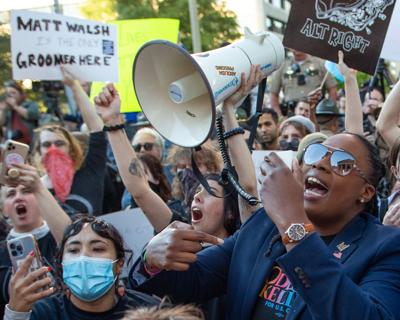A three-judge panel of the U.S. Sixth Circuit Court of Appeals sided with the states of Tennessee and Kentucky on Thursday when it overturned preliminary injunctions pausing implementation of bans on gender-affirming care like puberty blockers and hormone therapy for minors in those states.
The ruling affirmed an earlier decision that allowed the laws to go into effect, and the case will continue in the trial courts with the law in place. Some legal observers expect the issue to go before the U.S. Supreme Court in the coming years, as multiple federal circuits are considering cases originating in the states that in recent years have pushed to block such therapies for minors.
Tennessee Attorney General Jonathan Skrmetti calls the ruling "a big win for democracy."
"Decisions that are not clearly resolved by the Constitution should be resolved by the people through their elected representatives," he says. "I am so proud of our team who stood against the overwhelming resources arrayed against Tennesseans in this case."
After joining right-wing media figures at an anti-trans rally in Nashville in October 2022, prominent Tennessee Republican lawmakers pledged to pass legislation in 2023 banning treatments for minors. The law passed by the Tennessee legislature also banned gender-affirming surgical procedures, rare in Tennessee, but a trial court order halting implementation of the law applied only to the ban on puberty blockers and hormone therapies.
Though the law allowed for a nine-month unwinding process that would have allowed transgender youth to continue to receive treatment, the Pediatric Transgender Clinic at the Monroe Carell Jr. Children's Hospital at Vanderbilt University Medical Center preemptively ceased operations in June.
The lawsuit was filed by the ACLU of Tennessee, a local family, a Tennessee doctor and others. The U.S. Department of Justice has also sought to stop the law.
“This is a devastating result for transgender youth and their families in Tennessee and across the region," say Lambda Legal, the American Civil Liberties Union, the ACLU of Tennessee and Akin Gump Strauss Hauer & Feld LLP in a joint statement. "The disastrous impact of Tennessee’s law and all others like it has already been felt in thousands of homes and communities.
"Denying transgender youth equality before the law and needlessly withholding the necessary medical care their families and their doctors know is right for them has caused and will continue to cause serious harm. We are assessing our next steps and will take further action in defense of our clients and the constitutional rights of transgender people in Tennessee and across the country.”
The three-judge panel was split in its ruling.
"Tennessee’s and Kentucky’s laws tell minors and their parents that the minors cannot undergo medical care because of the accidents of their births and their failure to conform to how society believes boys and girls should look and live," writes Judge Helene White in her dissent from the majority. "The laws further deprive the parents — those whom we otherwise recognize as best suited to further their minor children’s interests — of their right to make medical decisions affecting their children in conjunction with their children and medical practitioners."
The majority, Judges Jeffrey Sutton and Amul Thapar, wrote that courts should defer to legislatures on the matter.
"This is a relatively new diagnosis with ever-shifting approaches to care over the last decade or two," they say. "Under these circumstances, it is difficult for anyone to be sure about predicting the long-term consequences of abandoning age limits of any sort for these treatments. That is precisely the kind of situation in which life-tenured judges construing a difficult-to-amend Constitution should be humble and careful about announcing new substantive due process or equal protection rights that limit accountable elected officials from sorting out these medical, social, and policy challenges."





